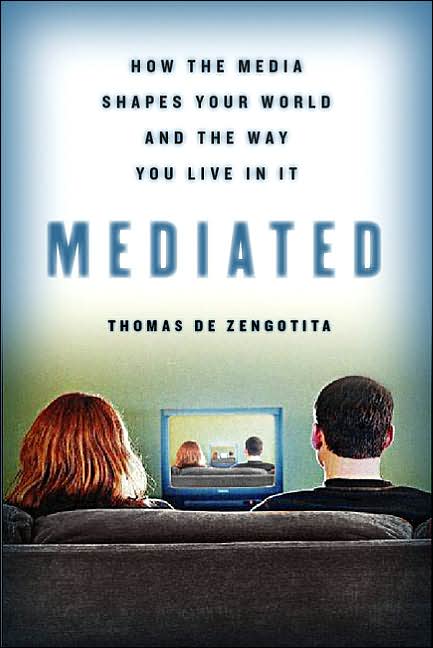Tuesday, March 11, 2008
De Zengotita's "Mediated"
 De Zengotita’s central tenet in “Mediated” is that images and forms the media produce serve primarily to cater to our self-centered nature, here called the “flattered self.” These feed the meaningless, amorphous “blob” of postmodern consumer culture, which serves no purpose in society. As the media becomes more fractured and prevalent, messages and truths become essentially meaningless. One problem with his “blob” concept stems from its primary characteristic: amorphousness. It flexes to encompass all of De Zengotita’s ideas. Ironically, in doing so, the concept of the blob diminishes the bite of his arguments, allowing him leeway to wiggle out of more detailed descriptions of his theories.
De Zengotita’s central tenet in “Mediated” is that images and forms the media produce serve primarily to cater to our self-centered nature, here called the “flattered self.” These feed the meaningless, amorphous “blob” of postmodern consumer culture, which serves no purpose in society. As the media becomes more fractured and prevalent, messages and truths become essentially meaningless. One problem with his “blob” concept stems from its primary characteristic: amorphousness. It flexes to encompass all of De Zengotita’s ideas. Ironically, in doing so, the concept of the blob diminishes the bite of his arguments, allowing him leeway to wiggle out of more detailed descriptions of his theories.He posits that the new power afforded to individuals alters various aspects of our lives, including puberty, politics, and entertainment. People no longer are able to “fill in the blanks” in the lives of their heroes, so heroes naturally become more local and less monolithic. Individuals are afforded god-like modes of power, making the “extraordinary” commonplace. The increased rate and type of interactions become overwhelming to individuals, who find themselves unable to process or deal with them. In reality, I would say this is a straw man argument; people rarely feel overwhelmed by information. What is not useful or required passed quickly through, not remembered and not harmful.
Like many scholars of a certain age, De Zengotita’s is pessimistic about the possibilities of media. One of his many suggestions is that a music concerts now “provide fans with the only experiences of transcendent social belonging most of them will ever know” (given that they are not religious and not “joiners”). It’s a provocative statement – but would he recognize such an event if it he found it? I believe he would be less likely to recognize such an event than other scholars who gives new forms of mass self-expression more credence. On other fronts, he is more convincing - take for instance his examples of interactions between “real” versus artificial through the complex interactions between audience and players in reality television, or the public revelation and cleansing of talk shows.
The “flattered self” and “meworld” cannot fully explain the multitude of interactions and motives encountered in modern life. It’s a difficulty we encounter since the rise of mass media, where the media are inexorable from its audience and participants. On the dust jacket, Norman Mailer praises the book, saying “there are anywhere from three to ten stimulating ideas on each page.” Indeed, De Zengotita’s ideas are poignant, and excuse his occasional overreaching or unconvincing example. (still, using one’s own children is an example of the latter… “weak tea” as a professor of mine frequently said)
The idea of the “flattered self” is an entirely appropriate metaphor for the current age. This basic concept is primarily what makes this book a provocative read. At one point, this was its title. If this remained as the title, the focus refined, and its arguments condensed, “Mediated” would be a true classic. Unfortunately, it’s not quite at the level of Neil Postman, although one can detect a few strokes of his felt-tipped pen in De Zengotita’s carefully considered arguments.
Labels: blob, de zengotita, mass media, mediation
